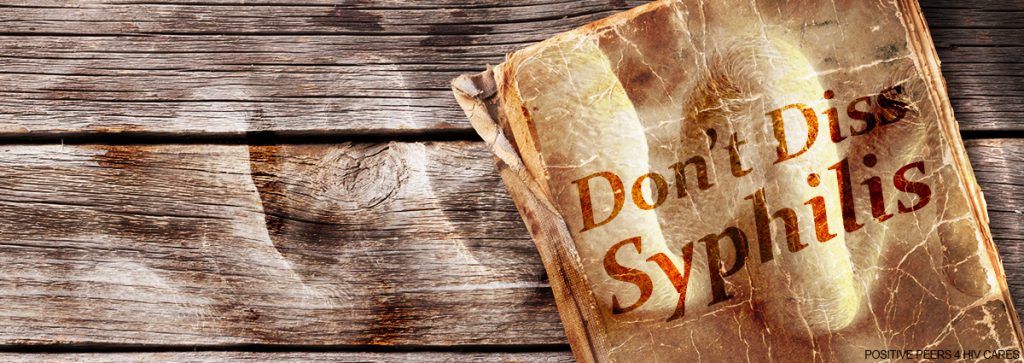
By: Ann K. Avery, MD, Infectious Disease Physician at MetroHealth Medical Center
Syphilis is one of the oldest and most annoying STIs (sexually transmitted infections). Doctors have been fighting syphilis for ages. It’s been curable for half a century, but it still hasn’t gone away.
A shot of penicillin usually gets rid of syphilis — which may give some people the impression that it’s no big deal, but it can really cause some damage. It can cause CD4 counts to fall and viral load to rise, and syphilis makes someone more likely to be infected or to infect others with HIV.
The worst part of syphilis? Most people don’t notice any symptoms and when they do, it’s easily mistaken for something else even by health providers.

The five kinds of syphilis
A bacterium called T. pallidum causes syphilis. The infection gets worse over time if you don’t treat it. It can progress through four stages or infect the central nervous system (the brain and the spinal cord) anytime.
- Primary. From two to six weeks after infection, someone with syphilis may get a painless sore called a “chancre” (pronounced: kang-ker) in the pelvic region (penis, vulva, vagina, or anus). Heads up, these sores can be inside your anus or vagina too!
Contact with the sore transmits the infection. The sore often heals but syphilis still remains in the body. If the infection isn’t treated in the first stage, the disease progresses.
- Secondary. In the next stage a rash usually appears on the palms or bottoms of the feet that look a bit like chicken pox. It could take months or years for the secondary stage to arrive, but usually it passes and people write it off as nothing but an abnormality.
- Latent. After few years of non-treatment, syphilis calms down and seems to go away. But it doesn’t really. It’s just taking a slow creeping crawl to the final phases.
- Tertiary. Eventually, the bacteria gets into the brain, the heart, the liver, and other vital systems, and starts breaking them down. People can suffer strokes, aneurysms, paralysis, and mental health issues.
- Neurosyphilis. Sometimes, the syphilis bacteria attacks the brain or the spinal column (or both). This is one of the most serious threats and it usually requires going to the hospital. Neurosyphilis can happen during any of the four stages. That’s why it’s best that a doctor evaluates a person’s symptoms and keep a close watch for it.
Penicillin is still one of the best treatments for syphilis, though other antibiotics are available if someone is allergic to penicillin.
Come join our private, stigma-free, supportive community.
Health management tools with medication & appointment reminders.
Social networking in a community conversation & private chats.
Syphilis prevention
It’s important to remember how syphilis spreads: The chancre or the lesions usually appear on or in the anus, penis, or vulva — but not always. They might show up on your thigh or somewhere else.
Currently, taking harm reduction measures like reducing partners, getting tested every 3-6 months, and using a condom is the best protection against giving or getting syphilis.
If you think you’re infected, it’s a good idea to see your doctor as soon as you can to get tested. Then you can get back to all the sexy time you want. But it’s usually suggested to stop all sexual contact until you’re sure the infection has cleared up.
Please keep in mind that you can still catch syphilis later. Antibiotics cure syphilis once, but they don’t make you immune to it.
Don’t be dissing syphilis
Now, here’s the thing about syphilis: There’s no need to be afraid if you educate yourself about how you can stay safe.
Like HIV, syphilis carries a lot of stigma. Nobody wants it, so there’s a lot of trash talking about people who get it. But talking smack about others doesn’t help people get treated or avoid getting it in the first place.
That’s why here at Positive Peers, we want to empower you with information and encourage kindness. A sexually transmitted infection, like Syphilis, is nothing more than a health condition. It’s not a fault or moral shortcoming. We encourage you to do all you can to avoid syphilis — giving it and getting it. That’s the best thing you can do for yourself and your partners.
More syphilis insight at Poz.com and CDC.gov.
Related Blogs:



